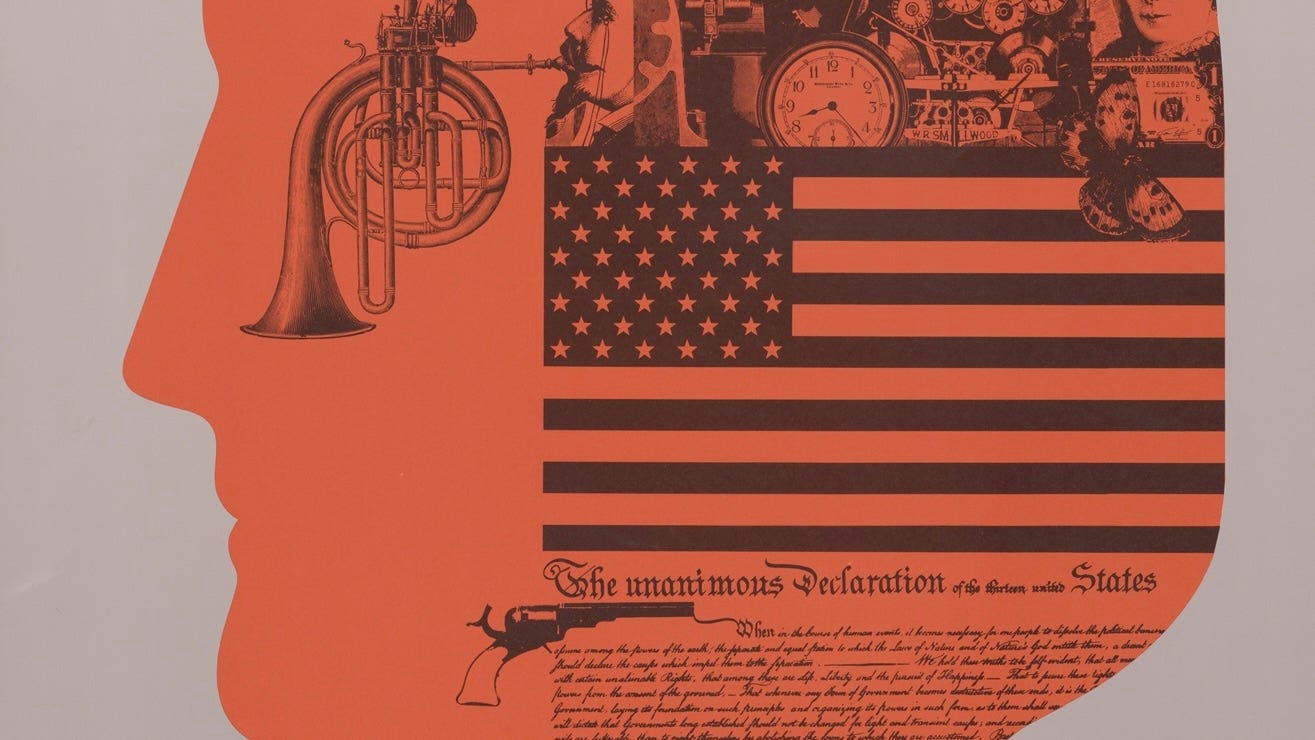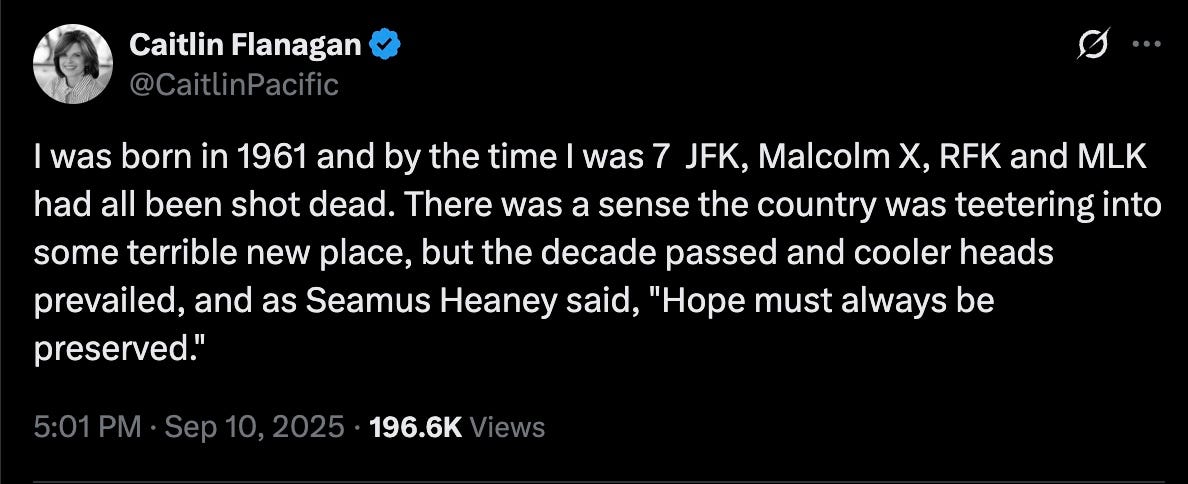Welcome to CrowdSource, your weekly guided tour of the latest intellectual disputes, ideological disagreements and national debates that piqued our interest (or inflamed our passions). This week: another murder.
Join us! CrowdSource features the best comments from The Crowd — our cherished readers and subscribers who, with their comments and emails, help make Wisdom of Crowds what it is.
Violent Reprise
In the wake of Charlie Kirk’s assassination, we’re re-upping some sadly evergreen content.
Why is America so violent?
The Question. Why have there been so many political assassinations, and assassination attempts, in the United States — a country with a relatively stable constitutional order, where peaceful transitions of power are the norm, rather than the exception?
53 Killings. According to a 2009 study, three countries share the world record for most political assassinations between 1875 and 2004: Spain, the Dominican Republic, and the United States.
Our Way of Life. On June 5, 1968, Robert F. Kennedy was assassinated in Los Angeles. That night on the Dick Cavett Show, a popular evening talk show, a distinguished panel discussed American violence. It is a fascinating historical document. One comment stands out, from a then-53 year-old broadcast journalist named David Schoenbrun:
What’s wrong with our country is not its basic health, but its way of life. And I think we must address ourselves to our way of life and where we stand today. For I cannot and will not believe that this was simply an accidental incident of one demented man. The coincidence is too strong. It’s part of the climate of violence in which we have been living for too long.
The Violent Will Bear It Away
Fresh reflections on America and violence.
Don’t Watch the Charlie Kirk Shooting Video! Nic Rowan with a bracing confession: “It is one thing to watch someone suffer, even die, in a short clip on social media. … But it is something else entirely to film that clip, post it, and then be rewarded for its popularity. I’ll admit it: I found it thrilling.”
“The Return of the Assassin.” Geoff Shullenberger on why targeted assassinations are eclipsing mass shootings:
The End of History, characterized by a form of power that seemed unassailable precisely because it was unlocalizable, also gave rise to the horrifying ritual of the mass shooting, a sort of public violence that was as strangely apolitical as power sought to be. This ritual now coexists with a reversion to the one that preceded it, offering a particularly grim indication of the schizoid regime under which we’re living.
Permission Structures. Julian Adorney on the different self-justifications for violence: “As much as we like to talk about one United States of America, from a sociological perspective it’s more like we’re several different tribes living alongside one another, each with its own permission structure.”
Beware the Diabolical Temptation to Blame Your Political Rivals, says Ross Douthat. “ ‘Diabolos’ in Greek means ‘accuser,’ and in that sense the dark spirit that inspires these crimes suffers a defeat when we react with unity and solidarity rather than immediate recriminations.”
“Speech, Art, and Life.” Katy Carl describes our volatile cultural moment:
A labeling culture, a dismissive and angry culture that nurtures and validates its own resentments and hatreds, is a culture of death. In this atmosphere it is almost as if words become flesh. It is almost as if what we most often voice, in the illusion of our own power, becomes at last what we helplessly are.
Grief and America. Anna Gát goes deep: “Grief and America are very similar places, they change your body, your biochemistry, your physiognomy. … America gives me intellectual vigor, pleasures, friends, adventures, and pride, but also true terror for the first time in my life …”
Will History Repeat Itself?
Two veteran journalists look to the past for hope.
We’ve Made it Through Before. A hopeful post by Atlantic essayist Caitlin Flanagan:
… But That Doesn’t Mean We’ll Make It Through Again. At least, not in the same way, suggests Reagan speechwriter and Pulitzer Prize-winning commentator Peggy Noonan:
For those of us who remember the 1960s and the killing of Medgar Evers, both Kennedys and Martin Luther King, it feels like we’re going through another terrible round of political violence. It’s tempting to think, “That was terrible but we got through it.” But the assassinations of the 1960s took place in a healthier country, one that respected itself more and was, for all its troubles, more at ease with itself. It had give. Part of why this moment is scary is that we are brittler, and we love each other less, maybe even love ourselves less. We have less respect for our own history, our story, and so that can’t act as the adhesive it once was. The assassinations of the 1960s felt anomalous, unlike us. Now political violence feels like something we do, which is a painful thought.
From the Crowd
Try looking at things from a slightly different angle, our readers tell Shadi and Damir.
Pendulum Swings. Longtime Wisdom of Crowds commenter Gemma Mason responds to Shadi Hamid’s column last week:
You [Shadi] write: “I suspect we may have to acclimate ourselves to a new order, one in which “progress” is no longer an upward if uneven curve but more like a pendulum.” But there’s nothing new about that! The story of civil rights is usually told this way. Slavery, emancipation, Reconstruction, then that long period before the civil rights movement of the 50s and 60s, followed by something of a conservative backlash in the 80s… there are always shifting currents.
Likewise with feminism, where the comparative liberation of the 20s (after women took on a broader range of roles during the First World War) was followed by the tight repression of the 50s (enforcing a gendered order for the returning veterans, this time around), followed by liberation of various types in the 60s and 70s, followed by the rise of evangelical anti-feminism in the 80s, followed by third/fourth wave feminism spreading from blogs into pop culture, followed by, uh, Trump. Back and forth and back and forth.
If anything, the pendulum sounds sort of comforting; it would seem like a guarantee of sorts that the pendulum will eventually swing back. But I genuinely don’t know what will happen in the years to come; I think this is one of those ways of understanding that only works backwards.
Rhetorical Inversion. Listening to last week’s podcast, Thomas Brown wonders if Damir Marusic is being too pessimistic:
I wonder if [Damir’s] “toilet bowl” comparison might not be overly pessimistic? We could simply be swirling around in the bowl at a consistent level, rather than actually going down the drain?
It occurs to me Trump’s condemnations of the radical left aren’t really an escalation, so much as an inversion of Biden’s rhetoric about white supremacist terrorism, which he often described as the gravest threat to the homeland, etc. (see e.g. this).
Of course it’s a shame that Trump didn’t respond like the governor of Utah did, but that wasn’t Biden’s approach, either.
See you next week!
Wisdom of Crowds is a platform challenging premises and understanding first principles on politics and culture. Join us!





